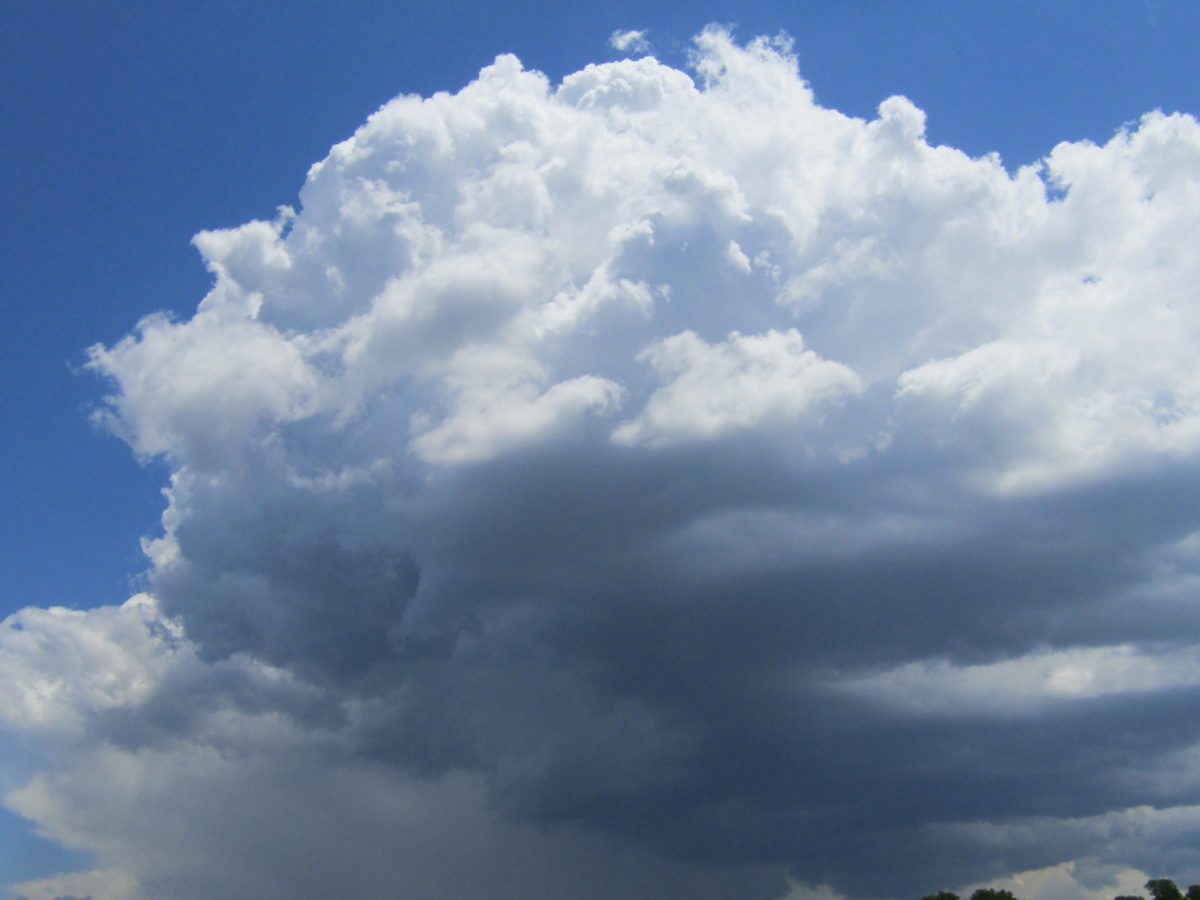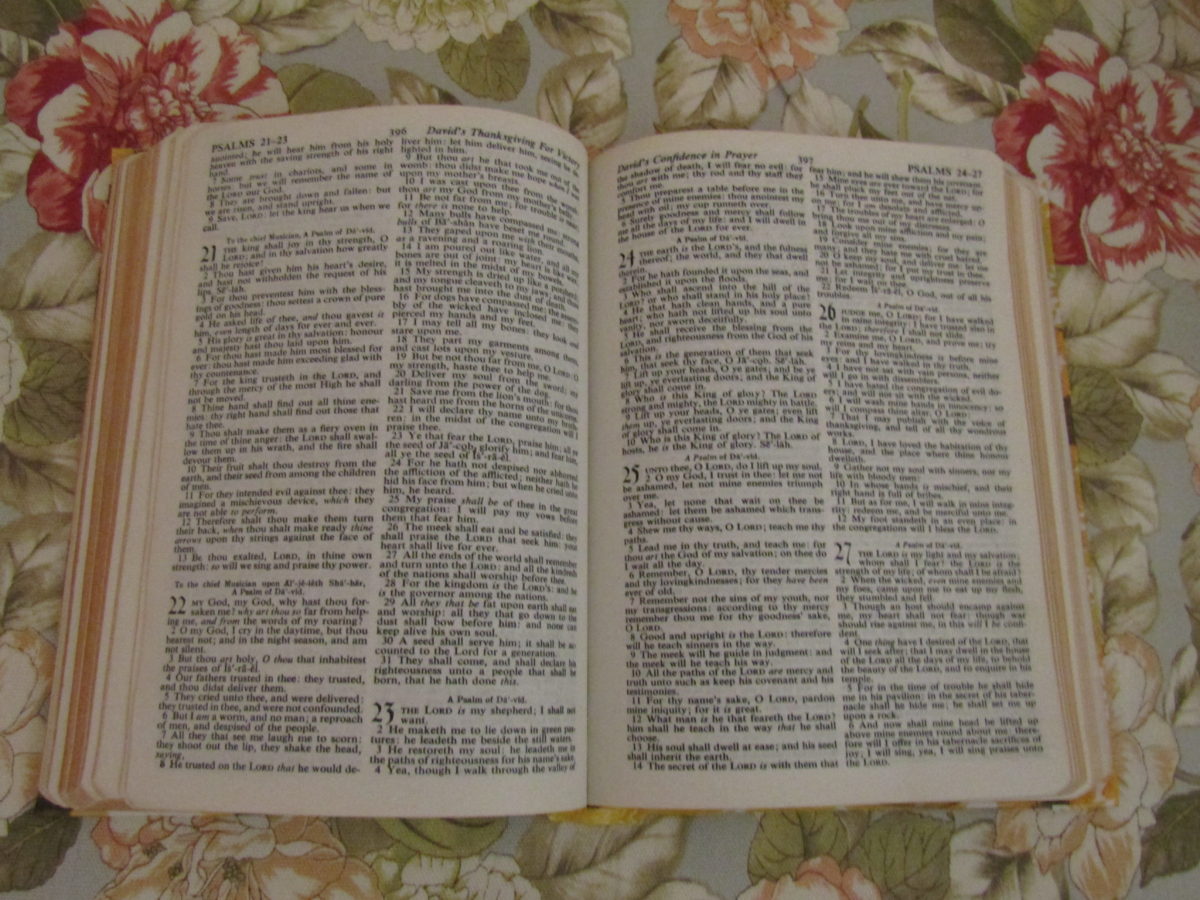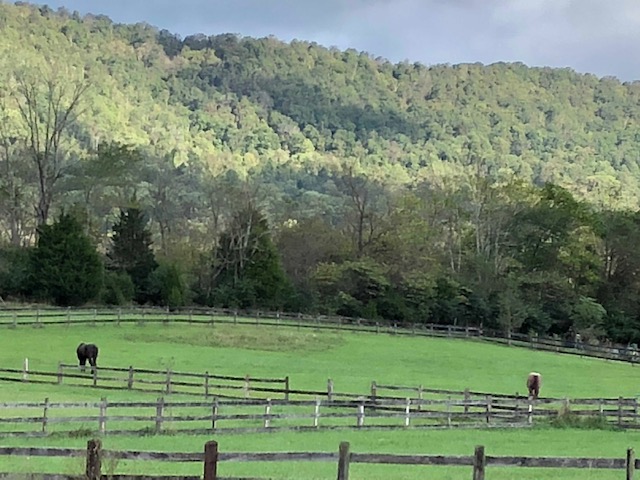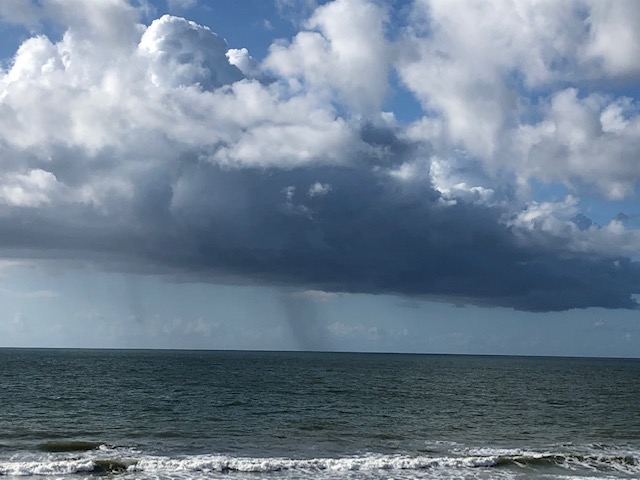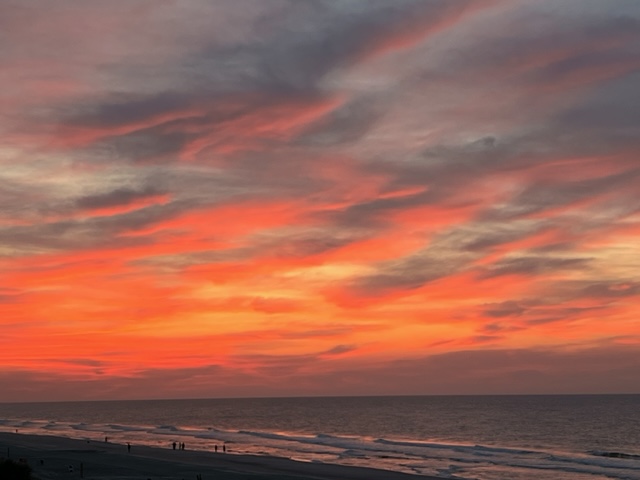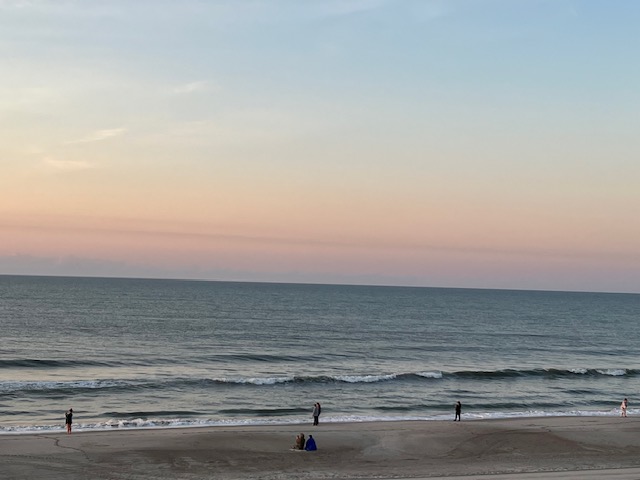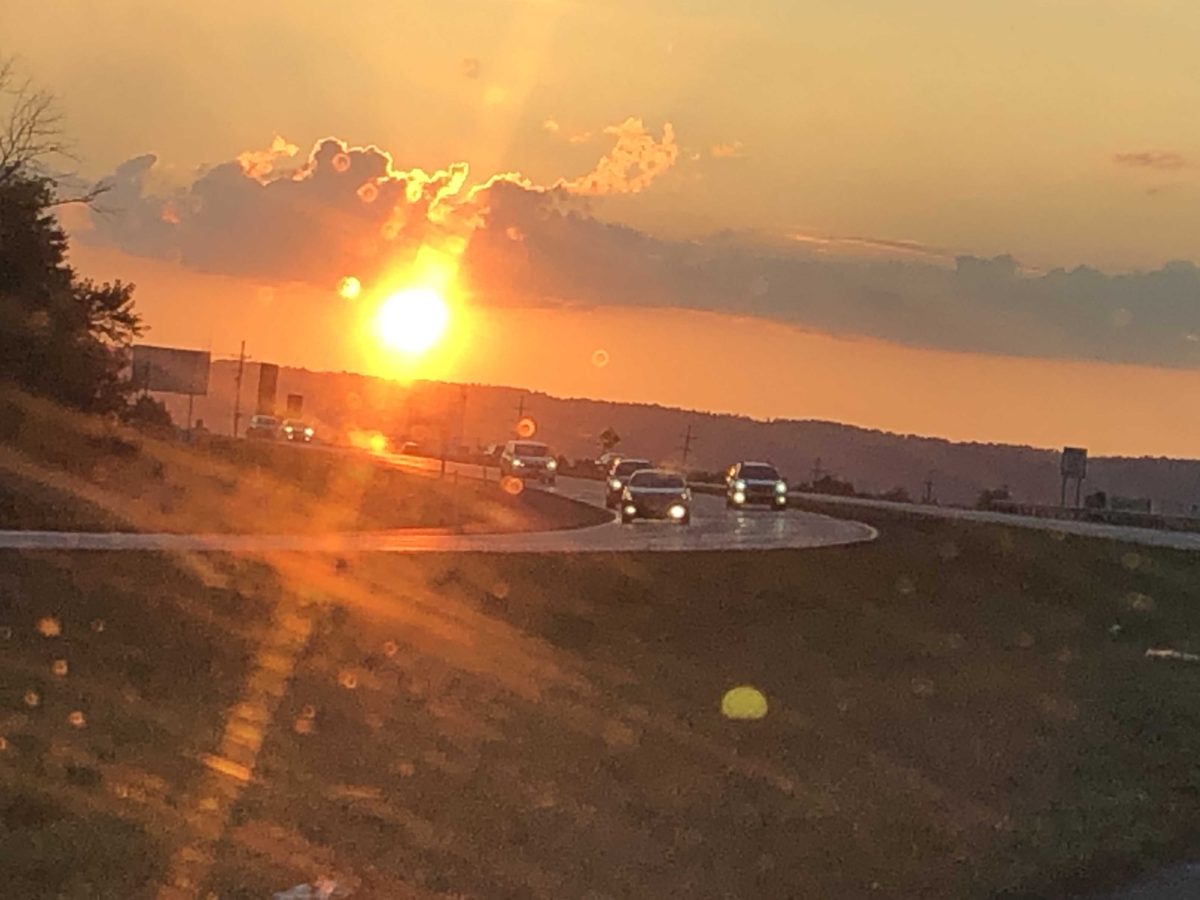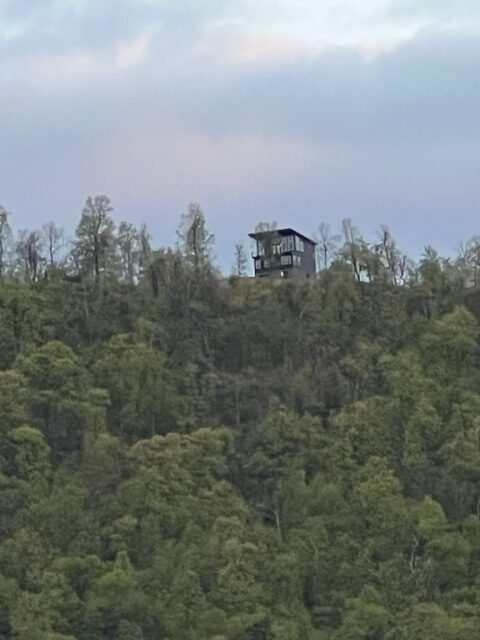We are sky watchers at our house. We are blessed to have the perfect vantage point for watching the sky. A wide-open space. We see sun ups, sun downs, millions of stars, the moon, planets and clouds. You might say we have our eye trained on the sky.
I was headed to Orr’s Farm Market (a Destination place) one day last August to pick up some peaches. The location is ripe for sky watching, it’s a wide-open space. As I get closer to the Farm Market, I started noticing the sky. It was one of those dog days of summer – hazy, hot, humid, and just plain stinky. You know those kinds of days when the sky is light blue and there are lots of beautiful, fluffy, white clouds rolling by.
I started thinking about those clouds. About how beautiful and big and bright and fluffy they looked. I started wondering what it would be like to touch a cloud. Can you touch a cloud? What is it made of? Does it have substance? As I travel on this quest to pursue God in all things, I asked myself that question. Do I have substance? So, what am I really made of?
Genesis 1:27 says that we were created in the imagine of God.
It says: “God created man in his own image, in the image of God He created him; male and female He created them.” Did you see that? Three times the word “created” is used in this passage. Created comes from the Hebrew word bara meaning “to create, make.” It is theologically significant in that when bara is used it only ever has God as its subject. It means creation out of nothing. The dictionary definition of create is: “to cause to come into being, as something unique that would not naturally evolve or that is not made by ordinary processes.” You see, we did not evolve, we were created!
Let’s look at it again. “God created man in his own image, in the image of God He created him; male and female He created them.” Did you see that? Two times the word “image” is used. The word “image” means that we were created to resemble God. To be like Him. To mirror Him. To take after Him. To copy Him. To mimic Him. To imitate Him. To embody Him. Do we look like our Father?
Now that I know what I’m made of, I have to ask the question again – Do I have substance or am I all fluff? I was physically formed by God to hold his Spirit, to embody Him. Do I have body or am I like a cloud, beautiful and bright but no substance? Am I all God-talk with no God-action? Do I say I love but not live love? Would I be scattered or dissipated when a strong wind blows? Am I dense but without substance? Am I substance over fluff? Does my character have substance?
The only way to develop Spiritual substance is to live daily in the presence of God. To study Him. To seek Him. To communicate with Him. To be obedient to Him. To love Him. To live Him.
The Apostle Paul wrote to the Church at Colosse:
So we have continued praying ever since we first heard about you. We ask God to give you a complete understanding of what he wants to do in your lives, and we ask him to make you wise with spiritual wisdom. Then the way you live will always honor and please the Lord, and you will continually do good, kind things for others. All the while, you will learn to know God better and better.
We also pray that you will be strengthened with his glorious power so that you will have all the patience and endurance you need. May you be filled with joy, always thanking the Father, who has enabled you to share the inheritance that belongs to God’s holy people, who live in the light. For he has rescued us from the one who rules in the kingdom of darkness, and he has brought us into the Kingdom of his dear Son. God has purchased our freedom with his blood and forgiven all our sins.
Colossians 1:9-14
We develop Spiritual substance by seeking God, being obedient to God, honoring God and living love. That’s how we learn to know God “better and better.” Increasing in the knowledge of God’s character will cause us to mimic, mirror, to look like, to embody Him.
Christ’s blood on the cross made us substantial. Made us righteous. Made us worthy. We were created in His image to be substantial, to have His substance.
We are sky watchers at our house. We are blessed to have the perfect vantage point for watching the sky. A wide-open space. We see sun ups, sun downs, millions of stars, the moon, planets and clouds. You might say we have our eye trained on the sky.
I was headed to Orr’s Farm Market (a Destination place) one day last August to pick up some peaches. The location is ripe for sky watching, it’s a wide-open space. As I get closer to the Farm Market, I started noticing the sky. It was one of those dog days of summer – hazy, hot, humid, and just plain stinky. You know those kinds of days when the sky is light blue and there are lots of beautiful, fluffy, white clouds rolling by.
I started thinking about those clouds. About how beautiful and big and bright and fluffy they looked. I started wondering what it would be like to touch a cloud. Can you touch a cloud? What is it made of? Does it have substance? As I travel on this quest to pursue God in all things, I asked myself that question. Do I have substance? So, what am I really made of?
Genesis 1:27 says that we were created in the imagine of God.
It says: “God created man in his own image, in the image of God He created him; male and female He created them.” Did you see that? Three times the word “created” is used in this passage. Created comes from the Hebrew word bara meaning “to create, make.” It is theologically significant in that when bara is used it only ever has God as its subject. It means creation out of nothing. The dictionary definition of create is: “to cause to come into being, as something unique that would not naturally evolve or that is not made by ordinary processes.” You see, we did not evolve, we were created!
Let’s look at it again. “God created man in his own image, in the image of God He created him; male and female He created them.” Did you see that? Two times the word “image” is used. The word “image” means that we were created to resemble God. To be like Him. To mirror Him. To take after Him. To copy Him. To mimic Him. To imitate Him. To embody Him. Do we look like our Father?
Now that I know what I’m made of, I have to ask the question again – Do I have substance or am I all fluff? I was physically formed by God to hold his Spirit, to embody Him. Do I have body or am I like a cloud, beautiful and bright but no substance? Am I all God-talk with no God-action? Do I say I love but not live love? Would I be scattered or dissipated when a strong wind blows? Am I dense but without substance? Am I substance over fluff? Does my character have substance?
The only way to develop Spiritual substance is to live daily in the presence of God. To study Him. To seek Him. To communicate with Him. To be obedient to Him. To love Him. To live Him.
The Apostle Paul wrote to the Church at Colosse:
So we have continued praying ever since we first heard about you. We ask God to give you a complete understanding of what he wants to do in your lives, and we ask him to make you wise with spiritual wisdom. Then the way you live will always honor and please the Lord, and you will continually do good, kind things for others. All the while, you will learn to know God better and better.
We also pray that you will be strengthened with his glorious power so that you will have all the patience and endurance you need. May you be filled with joy, always thanking the Father, who has enabled you to share the inheritance that belongs to God’s holy people, who live in the light. For he has rescued us from the one who rules in the kingdom of darkness, and he has brought us into the Kingdom of his dear Son. God has purchased our freedom with his blood and forgiven all our sins.
Colossians 1:9-14
We develop Spiritual substance by seeking God, being obedient to God, honoring God and living love. That’s how we learn to know God “better and better.” Increasing in the knowledge of God’s character will cause us to mimic, mirror, to look like, to embody Him.
Christ’s blood on the cross made us substantial. Made us righteous. Made us worthy. We were created in His image to be substantial, to have His substance.
I praise you for the honor of being created in Your image. Lord, help me to know you better and better so that I may live as you created me to be – Spiritually substantive. Amen.


